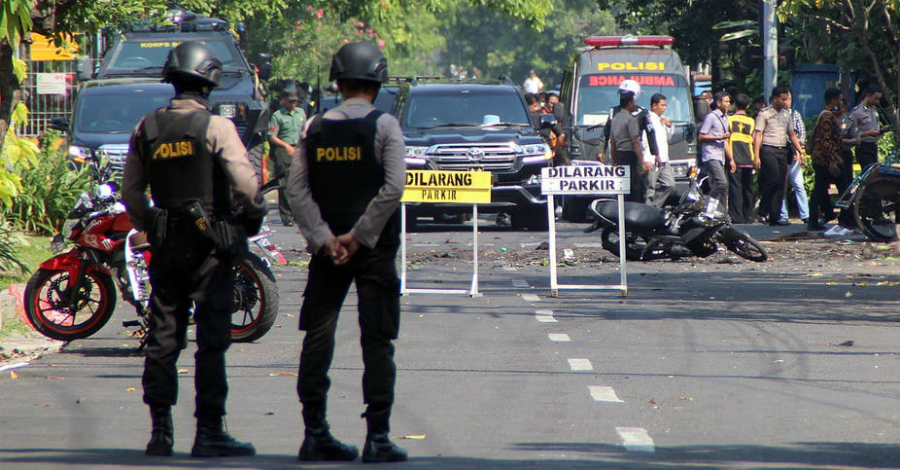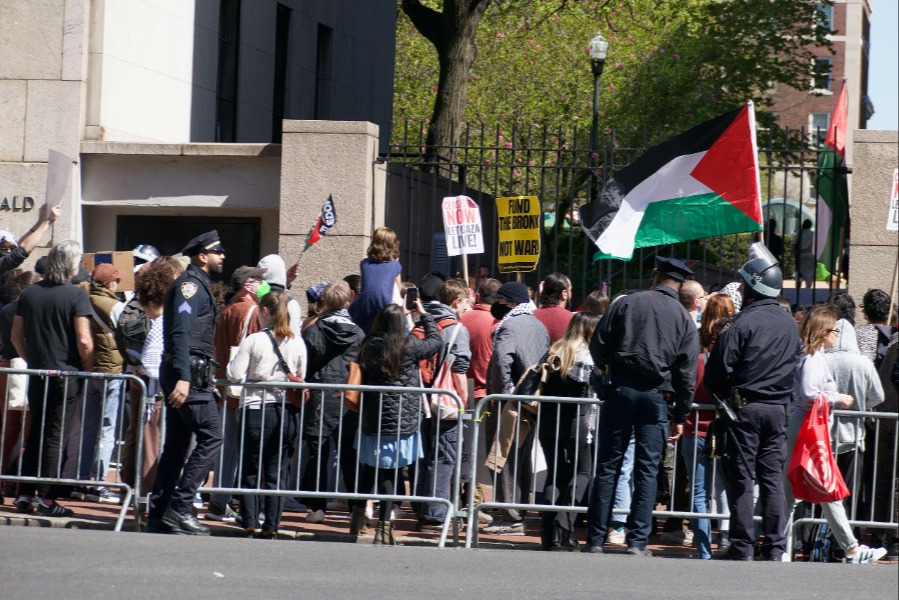U.S. Engagement with Indonesia Can Help Prevent Tomorrow’s Crises
The Jan. 29 Senate testimony by intelligence community leaders highlighted a number of crisis areas that were of little surprise to most followers of the news: U.S. troops and advisers are engaged around the globe working with allies and others to address critical issues in Syria and Iraq, and managing threats from Russia, China, North Korea, Iran and elsewhere.

Published by The Lawfare Institute
in Cooperation With

The Jan. 29 Senate testimony by intelligence community leaders highlighted a number of crisis areas that were of little surprise to most followers of the news: U.S. troops and advisers are engaged around the globe working with allies and others to address critical issues in Syria and Iraq, and managing threats from Russia, China, North Korea, Iran and elsewhere. But as intelligence professionals know, much important work takes place outside areas mentioned in the annual Worldwide Threat Assessment.
Although it was not discussed in the Senate hearing, Indonesia deserves particular attention. As the Islamic State’s territory dwindles in Syria and Iraq, its supporters are likely to look for new homes in regions where Islamist terrorism has thrived. It is likely to turn toward Southeast Asia; as the New York Times reported on March 9, the Islamic State has made inroads in the Philippines, and it will probably explore Indonesia as well. The modern country of Indonesia has had a tumultuous history since its founding seven decades ago, but in recent years it has developed a thriving economy and stable government. Indonesia’s strategic location and large Muslim population make it an important player in Southeast Asia that would merit U.S. attention under any circumstances, but rumblings of renewed jihadism that poses a threat domestically and abroad give the country even greater salience.
Indonesia’s geography and demographics demonstrate its international importance. It is the fourth-largest country by population and home to almost as many Muslims as in the entire Arab Middle East. It occupies a strategic location alongside the globe’s busiest trading routes. For several years following the ouster of dictator Suharto in 1998, there was concern in the international community that Indonesia could become a failed state. Throughout the 2000s, regular attacks, including bombings in the capital city of Jakarta and on the tourist island of Bali, suggested that Indonesia risked becoming home to globally affiliated terrorist groups.
By 2010, a committed effort by the Indonesian government supported by the United States and Australia had largely defeated al-Qaeda-affiliated groups in the country. Since then, Indonesia has been largely a good-news story. Sustained economic growth, improved governance and a dedicated effort by Indonesian police forces turned things around to the point where the country has now become a key player in the G-20, the Association of Southeast Asian Nations and other multilateral diplomatic organizations.
However, there are troubling signs of late. Radical Islamism is again on the rise in Indonesia, and the Islamic State has been making inroads. As many as 1,500 Indonesian citizens have joined the Islamic State in recent years, and the sophistication of terrorist attacks has increased. In 2018, a series of suicide bombings targeting churches rocked the city of Surabaya, with the sophisticated bombs carried by children as young as 9 years old. Before that, in May 2017, the former governor of the Jakarta region was convicted and imprisoned for blasphemy against Islam—a sign that a more radical interpretation of political Islam is taking hold in parts of the country. Even more troubling, President Joko Widodo announced in January that Abu Bakar Bashir, the spiritual leader of al-Qaeda’s Southeast Asian franchise, Jemaah Islamiyah, would be granted an early release from prison.
To declare victory in Syria but allow a new home for radical groups in Southeast Asia would be a disaster for the United States and its partners. In this sense, the omission of Indonesia from the annual Worldwide Threat Assessment is less about acknowledging today’s hot spots than it is about focusing the administration’s attention and resources on areas where they will provide the most benefit in coming years.
Sukarno and the Modern Indonesian State
Indonesia consists of more than 17,000 islands and is home to more than 300 different ethnic groups, hundreds of languages and multiple religious traditions. Though more than 200 million Sunni Muslims live in Indonesia, it does not consider itself an Islamic state like Pakistan, Afghanistan, Saudi Arabia or Egypt. There is no reference to Islam in Indonesia’s constitution, and the country has a long tradition of religious tolerance.
Modern Indonesia is the inheritor state of the former Dutch East Indies. The independent Republic of Indonesia was established in 1949 following occupation by the Japanese during World War II and the expulsion of the Dutch colonists. At the time of independence, two groups held rival visions for Indonesia. One group, led by the charismatic populist Sukarno, was a largely nationalist movement by the country’s largest ethnic group, the Javanese. The other group was led by Sekarmadji Kartosuwirjo, whose militia was focused on creating an Islamic state governed by sharia law.
In 1945, Sukarno took control of the government and oversaw efforts to write a new constitution. His ideology, known as Pancasila, guaranteed freedom of religion, which helped unite Indonesia’s numerous ethnic and religious groups. Angry that Indonesia had not become an Islamic state, Kartosuwirjo initiated a civil war that lasted until his execution in 1962 and led to the deaths of tens of thousands.
Sukarno described his system of government as “guided democracy.” By the mid-1960s, however, he began to flirt with communism, alienating both the West and his own military. He was deposed by the military and replaced in 1967 by the strongman Suharto. Suharto’s “New Order” government, which held power for 31 years, was a centralized, authoritarian and military-dominated regime whose objective was to destroy communism and suppress any Islamist threats to its rule.
Islamic Fundamentalism in Indonesia
Under Suharto, the remnants of Kartosuwirjo’s movement went underground and found a second life in Islamic boarding schools, called pesantrens. Clerics and graduates of the pesantrens refused to recognize Indonesia’s secular government and openly advocated for sharia law. A minority of the students engaged in terrorism to fight the state. Over the years, these groups have fought under a variety of names—Komando Jihad, Jemaah Islamiyah, Laskar Jihad, al-Qaeda, Jemaah Ansharut Tauhid (JAT) and Mujahidin Indonesia Timur.
Kartosuwirjo’s most well-known disciple was the Muslim cleric and godfather of the Jemaah Islamiyah terrorist group, Abu Bakar Bashir. Over the years, Bashir has been tied to dozens of terrorist attacks and been in and out of jail. He has sworn oaths of allegiance to both Osama bin Laden and the Islamic State, and continues to control the JAT terrorist group from prison. Bashir has been the key instigator and supporter for Indonesia’s most heinous terrorists. He sent Hambali, an infamous terrorist, to work directly with bin Laden on the 9/11 attacks in Afghanistan and Pakistan. He also supported Umar Patek, the mastermind of the 2002 Bali bombings—who was arrested in 2011 in Abbottabad, Pakistan, just blocks from bin Laden’s hideout—and Noordin Top, a key al-Qaeda bomb maker who orchestrated attacks throughout Indonesia from 2003 to 2009.
There are additional signs that Indonesia is insufficiently committed to tackling this problem. In a Feb. 14 New York Times op-ed, Indonesian writer Eka Kurnianwan outlines how democratic ideals are on the wane in Indonesia, and that hopefuls in the upcoming presidential election are increasingly squabbling over who is more committed to the Islamization of Indonesian society. Conservative and radical groups are on the rise, potentially threatening Indonesia’s moderating role in Southeast Asia and in the Muslim world.
Indonesia’s lack of social unrest and tradition of tolerance have ensured that those willing to engage in terrorism have a hard time building a following. However, rampant corruption, a weak judicial and prison system, and poorly written laws make it hard for Indonesian authorities to effectively battle Kartosuwirjo’s ideological descendants. Membership in or recruitment for the Islamic State was made illegal only last year, as part of a sweeping revision to the country’s terrorism law. These changes have given law enforcement important tools to intervene before an attack occurs, but they have also been criticized for involving the military in combating terrorism, stripping citizenship from suspected terrorists and criminalizing possession of radical propaganda, which some experts argue could well make matters worse. Even when police do apprehend suspects, the porous prison system allows prisoners to maintain their contacts with other jihadists, and even orchestrate attacks from jail.
While the good news is that the number of Indonesians willing to engage in terrorism is small, the bad news is that access to terrorist training grounds such as Syria has increased. Similar to the generation that trained in Afghanistan and Pakistan, Syria has become a training ground where wannabe jihadis can develop lethal competence before returning to Indonesia. Additionally, Indonesia is one of the most cyber-connected places on earth, and undereducated youth are potentially susceptible to Islamic State-sponsored social media campaigns. This risk has manifested itself lately is the rise in the number of Indonesian women seeking online marriages with fighters in Syria, in the hopes of raising children in an “Islamic State.”
Though Indonesia was not mentioned in the intelligence community’s report to Congress, it nonetheless requires continued attention and support. It would be self-defeating if resources were diverted from Indonesia due to its absence in the 2019 Worldwide Threat Assessment. The United States and its allies need to continue the slow and difficult work of building relationships, strengthening institutions, and investing in strong economic and political ties. The United States should work with regional partners to reinforce the resources and professionalism of Indonesian law enforcement, continue to build a robust civil society, strengthen the judicial system through training and funding, and work to professionalize the shabby Indonesian prison system. This type of work does not appear on the front pages of U.S. newspapers, but it is our best defense against the rise of serious threats in the future.





